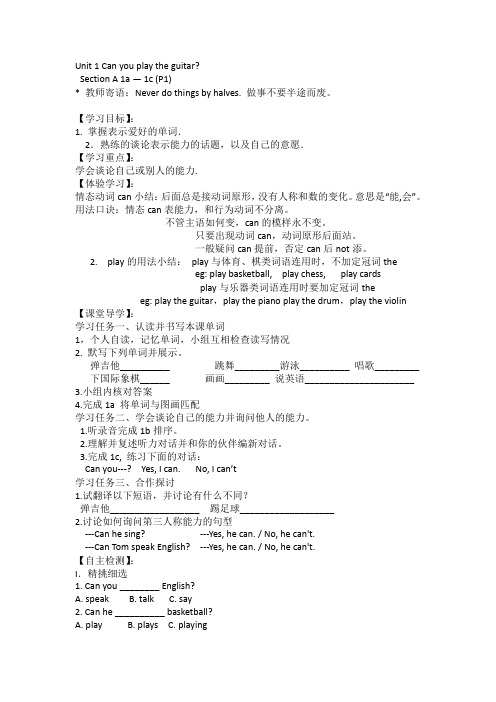人教版初中英语七年级下册Unit1SectionB教材全解
- 格式:doc
- 大小:92.50 KB
- 文档页数:6



Unit 1 Can you play the guitar?Section A 1a — 1c (P1)* 教师寄语:Never do things by halves. 做事不要半途而废。
【学习目标】:1. 掌握表示爱好的单词.2.熟练的谈论表示能力的话题,以及自己的意愿.【学习重点】:学会谈论自己或别人的能力.【体验学习】:情态动词can小结:后面总是接动词原形,没有人称和数的变化。
意思是“能,会”。
用法口诀:情态can表能力,和行为动词不分离。
不管主语如何变,can的模样永不变。
只要出现动词can,动词原形后面站。
一般疑问can提前,否定can后not添。
2. play的用法小结:play与体育、棋类词语连用时,不加定冠词theeg: play basketball, play chess, play cardsplay与乐器类词语连用时要加定冠词theeg: play the guitar,play the piano play the drum,play the violin 【课堂导学】:学习任务一、认读并书写本课单词1,个人自读,记忆单词,小组互相检查读写情况2. 默写下列单词并展示。
弹吉他__________ 跳舞_________游泳__________ 唱歌_________ 下国际象棋______ 画画_________ 说英语______________________3.小组内核对答案4.完成1a 将单词与图画匹配学习任务二、学会谈论自己的能力并询问他人的能力。
1.听录音完成1b排序。
2.理解并复述听力对话并和你的伙伴编新对话。
3.完成1c, 练习下面的对话:Can you---? Yes, I can. No, I can’t学习任务三、合作探讨1.试翻译以下短语,并讨论有什么不同?弹吉他__________________ 踢足球___________________2.讨论如何询问第三人称能力的句型---Can he sing? ---Yes, he can. / No, he can't.---Can Tom speak English? ---Yes, he can. / No, he can't.【自主检测】:I.精挑细选1. Can you ________ English?A. speakB. talkC. say2. Can he __________ basketball?A. playB. playsC. playing3. My brother want _______ the chess club.A. joinB. to joinC. joins4. Mary can play the chess________ she can't swim.A. andB. orC. but5. His brother plays _______ piano every day.A. /B. aC. theII.翻译官说英语_____________ 弹吉他_____________ 象棋俱乐部__________ 下象棋______________ 英语俱乐部_____________ 音乐俱乐部__________ 美术俱乐部___________ 游泳俱乐部_____________ 参加___________ Ⅲ. 补全对话A. Can you ___________(唱歌)?B. Yes, I ________. Can you _________(游泳)?A. No, I want to join _______________(象棋俱乐部).B. I don't like ______________(象棋)A. What club do you want to __________?B. I want to join __________________(游泳俱乐部)【快乐链接】英汉对对碰:Match each word with the right Chinese meaning.Unit 1 Can you play the guitar?Section A 2a— 2d (P2)* 教师寄语:Never do things by halves. 做事不要半途而废。



人教版初中英语七年级下册Unit1SectionB教材全解Unit 1 Can you play the guitar?Unit 1 Section B教材全解1.Hello,I’m Peter.I like to play basketball.I can speak English and I can also play soccer.你好!我是彼特。
我喜欢打篮球。
我会说英语,也会踢足球。
【重点注释】①I like to play basketball.我喜欢打篮球。
like doing sth.和like to do sth.都表示“喜欢做某事”,但动名词所表示的动作,在意义上比较一般和抽象,时间观念不强,不指某一次动作;动词不定式则常指某个具体的一次性的动作。
例如:She likes swimming.她喜欢游泳(经常性的爱好)。
She likes to swim this afternoon.她今天下午想游泳(特指某一次的动作)。
另外,在搭配(使用方法)上,还有一点区别:(1)“like to do sth.”一般与“would”搭配,构成would like (would like 后面只能跟动词不定式,即woule like to do sth.),表示“意愿”。
例如:I would like to swim with you .我愿意和你去游泳。
Would you like to skate? 你愿意去滑冰吗?Would you like to have some bananas?你想吃些香蕉吗?(2)“like doing sth.”表示“爱好”。
例如:I like watching TV.我喜欢看电视。
Do you like singing ?你喜欢唱歌吗?②I can speak English and I can also play soccer.我会说英语,也会踢足球。
人教版初中英语七年级下册Unit1SectionB教材全解Unit 1 Can you play the guitar?Unit 1 Section B教材全解1.Hello,I’m Peter.I like to play basketball.I can speak English and I can also play soccer.你好!我是彼特。
我喜欢打篮球。
我会说英语,也会踢足球。
【重点注释】①I like to play basketball.我喜欢打篮球。
like doing sth.和like to do sth.都表示“喜欢做某事”,但动名词所表示的动作,在意义上比较一般和抽象,时间观念不强,不指某一次动作;动词不定式则常指某个具体的一次性的动作。
例如:She likes swimming.她喜欢游泳(经常性的爱好)。
She likes to swim this afternoon.她今天下午想游泳(特指某一次的动作)。
另外,在搭配(使用方法)上,还有一点区别:(1)“like to do sth.”一般与“would”搭配,构成would like (would like 后面只能跟动词不定式,即woule like to do sth.),表示“意愿”。
例如:I would like to swim with you .我愿意和你去游泳。
Would you like to skate? 你愿意去滑冰吗?Would you like to have some bananas?你想吃些香蕉吗?(2)“like doing sth.”表示“爱好”。
例如:I like watching TV.我喜欢看电视。
Do you like singing ?你喜欢唱歌吗?②I can speak English and I can also play soccer.我会说英语,也会踢足球。
这是一个并列句,由连词and连接两个简单句。
and可以连接语法作用相同的词、短语或句子,表示并列或对称的关系,可翻译为“和;并(且);又;兼”等。
例如:Mille and Amy go to the park every week.米莉和艾米每周都去公园。
They love playing football and we love playing football too.他们喜欢踢足球,我们也喜欢踢足球。
【比较记忆】Unit 1 Section A课文全析5:Lisa wants to join the chess club,but she can’t play chess.莉萨想加入国际象棋俱乐部,但她不会下国际象棋。
but,连词,表示转折关系,意为“但是”。
而and是表示并列、递进关系的连词,意为“并且”。
例如:She can dance,but she can’t sing.她会跳舞,但她不会唱歌。
I can play the piano,and I play it very well.我会弹钢琴,并且弹得很好。
③副词also意思是“也”。
例如:I’m 19 years old.John is also 19 years old.我19岁,约翰也19岁。
She can also speak English.她也会说英语。
I also want some tea.我也要点茶。
I know the answer,too.我也知道答案。
注意:too修饰形容词或副词,作程度状语时,表示“太,过分”之意。
例如:He speaks too fast.他说话太快。
The boy is too young.这个男孩太小了。
2.Hi,I’m Ma Huan.I can play ping-pong and chess.I like to talk and play games with people.嗨,我是马欢。
我会乒乓球和国际象棋。
我喜欢与人交谈和玩游戏。
【重点注释】①I can play ping-pong and chess.= I can play ping-pong and I can play chess.我会打乒乓球,也会下国际象棋。
I like to talk and play games with people.= Ilike to talk to people and I like to play games with people.我喜欢和人交谈,也喜欢和人玩游戏。
②play games做(玩)游戏。
play games with sb.和某人一起做游戏。
③people泛指“人们”,是集体名词,作主语时谓语动词用复数形式。
例如:Some people speak French in this country.在这个国家,一部分人讲法语。
【拓展记忆】1)the people意为“人民”。
例如:We study hard for the people.我们为人民努力学习。
2)people还可表示“民族;种族”,是可数名词,其复数形式为peoples。
例如:There are fifty-six peoples in China.中国有56个民族。
3.Are you busy after school?No?Can you speak English?Yes?Then we need you to help with sports for English-speaking students.It’s relaxing and easy!放学后你忙吗?不忙?你会说英语吗?是的?那么,我们需要你帮助说英语的学生进行体育运动。
它轻松且容易!【重点注释】①busy形容词,意为“忙的,繁忙的”,反义词是free,意为“空闲的,有空的”。
be busy=have no time=be not free很忙.形容词常和be连用,作表语。
如短文下一句:It’s relaxing and easy!它轻松且容易!【试题链接】根据句子中所给单词的首字母或中文提示,填写正确的单词。
Ted is so b that he has no time to watch TV in the evenings. (由句意“在晚上,泰德如此忙以至于他没有时间看电视。
”知此处需填形容词busy。
)【拓展记忆】be busy with sth.忙于某事/be busy(in) doing sth.忙于做某事。
例如:My uncle is busy with his work.我叔叔正忙着他的工作。
I am busy doing my homework.我正忙着做我的家庭作业。
be busy doing sth侧重于动作,sth.是名词或代词,do是动词的形式,doing是v.ing形式。
be busy with sth.侧重于状态。
be busy后跟名词或代词,用with;be busy后跟动词,用v.ing形式。
两者意思都一样,可以互换。
例如:He is busy doing his homework(他忙着做家庭作业).=He is busy with his homework(他忙于家庭作业). He’s busy with(playing) soccer.他忙于踢足球。
They’re busy watching TV.他们忙着看电视。
注意:不要出现用with,还用v.ing形式。
We’re busy with cleaning the classroom.(×)②Then we need you to help with sports for English-speaking students.那么,我们需要你帮助说英语的学生开展体育活动。
need作为实义动词,意为“需要”,此时need有人称和数的变化,need后面的宾语可以是名词、动名词(v.ing)、动词不定式或代词。
need to do sth.意为“需要做某事”;need sb.to do sth.意为“需要某人做某事”;need后面接动名词(v.ing)时,动名词表被动意思,此时主语常为物。
The room needs cleaning.这个房间需要打扫。
need既可用于肯定句,也可用于否定句和疑问句,构成否定句和疑问句时要借助于助动词do或does等。
例如:You need to talk with your mother.你需要和你妈妈谈谈。
Does your father need any help?你爸爸需要帮助吗?注意:need sth.需要某物。
need to do sth.需要做某事。
need sb. to do sth.需要某人做某事。
例如:I need a sweater.我需要一件毛衣。
I need a pencil.我需要一支铅笔。
I need to do my homework.我需要做我的家庭作业。
I need you to help me.我需要你帮我。
He needs to see a doctor.他需要看医生。
【拓展记忆】need用作情态动词时,意思是“有必要”或“需要”,其后接动词原形,通常只用于否定句或疑问句。
例如:You needn’t worry.你不必担心。
Why need you go today?为什么你需要今天走?注意:由于用作情态动词的need通常不用于肯定句,所以对于以need开头的一般疑问句的否定回答可用needn’t,但是肯定回答却不能用Yes,you need.之类,应根据具体情况改用其他表达。
例如:——Need I come tomorrow?明天我需要来吗?——No,you needn’t.不,你没有必要来。
—Need he stay here?他有必要留在这儿吗?—Yes,he must.是的,必须留在这儿。
③Then we need you to help with sports for English-speaking students.那么,我们需要你帮助说英语的学生进行体育运动。
help的用法:1)help with (doing)sth.(名词或代词)在某方面帮助;帮助(做)……;帮助(做)某事(help with 后面接物等名词时,翻译汉语时可以加上动词)。
本句中help with sports=help with having sports意为“帮着进行体育运动”;help with sports for English-speaking students意为“帮助说英语的学生进行体育运动”。
例如:May I help with(taking) the books? 我帮(你)(拿)这些书好吗?Do you need some help with(taking) those bags?你需要帮忙(拿,搬)那些袋子吗?May I help with (washing)the bowls?我帮你(洗)碗,好吗? 2)help sb.with sth(名词或代词).在某方面帮助某人;帮助某人(做)某事(注意:这个短语在with与后面的名词间一般会加上冠词或形容词性物主代词这样的限定词.Can you help me with my English?)。